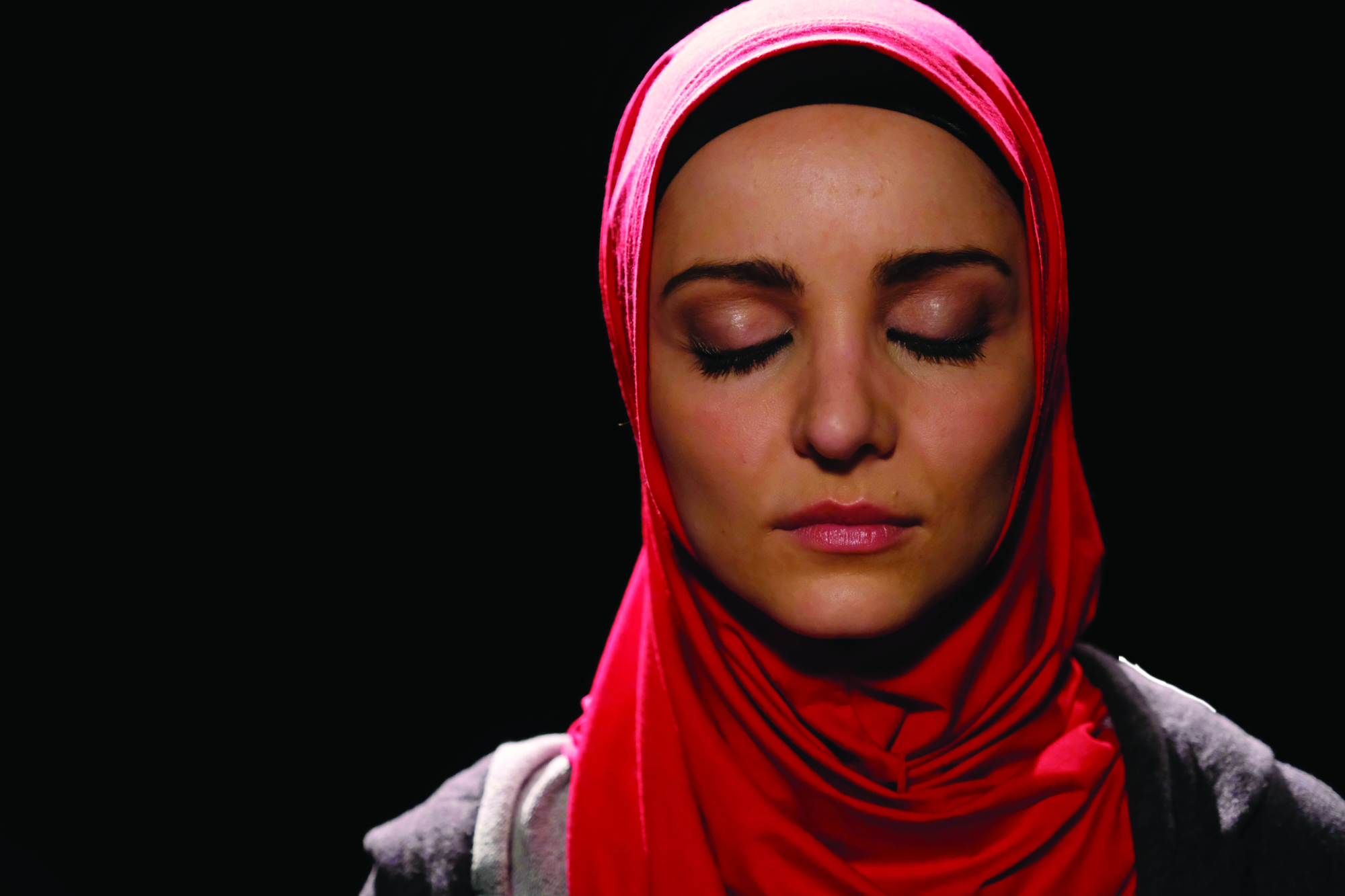The latest feature by Sydney-based filmmaker Partho Sen-Gupta, Slam (2018), is haunted by a terrifying moment from his past. As a child growing up in Mumbai, he paid scant attention to dire warnings from his parents about the threat of kidnappings until, one terrifying day, when he was around seven or eight years old, a man attempted to snatch him outside his home. ‘I didn’t realise then how traumatic an experience that was,’ he recalls of the startling near-miss that haunts him, especially now that he has become a father himself.
For many years, the memory was locked away within a dark recess in the 54-year-old director’s mind. But the full weight of the attack rammed back into his consciousness when he saw a poster of a missing girl on a return trip to Mumbai: ‘It all came back to me.’ His partner, Alana Lentin, a political sociologist and social theorist at Western Sydney University, was pregnant at the time, and the creeping trauma sparked a primal dread in Sen-Gupta. ‘I took a look at the statistics, which I had completely ignored until then, and realised something like 100,000 children had vanished,’ he says. Indeed, according to a 2017 paper, some eleven children go missing every hour in India, four of whom are never recovered.[1]Rituparna Bhattacharyya, ‘Sociologies of India’s Missing Children’, Asian Social Work and Policy Review, vol. 11,
no. 1, 2017, p. 92.
During a recent trip back to India to visit his elderly mother, Sen-Gupta couldn’t help but grip his daughter’s hand tightly. ‘She is nine going on fifteen and was like, “Come on, Dad, it’s alright.”’
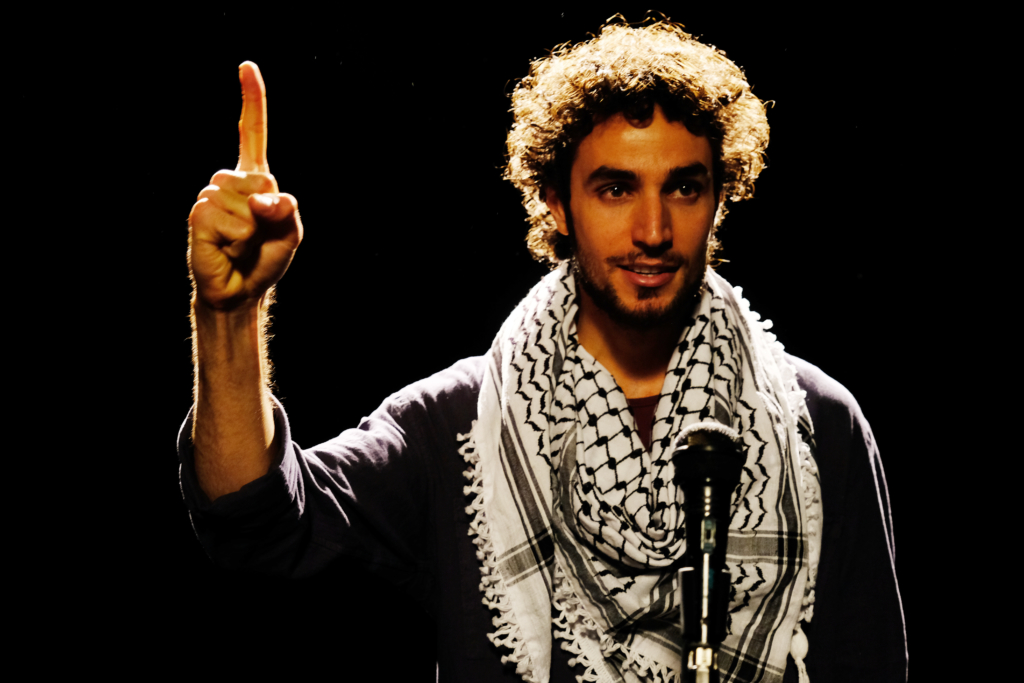
Missing link
This stark reality formed the basis of Sen-Gupta’s second feature, the Marathi-language Sunrise (2014), a nightmarish, monsoon-lashed thriller starring Adil Hussain as a wits’-end cop determined to recover his daughter from a shadowy child-snatching ring. The idea of tracing the hole left behind by a missing person is echoed in his third feature, the predominantly English-language, Western Sydney–set Slam. Debuting at the 2018 Tallinn Black Nights Film Festival, the film had its Australian premiere at this year’s Sydney Film Festival and subsequently screened at the Melbourne International Film Festival (MIFF).
Slam opens on the pink hijab–wearing, Palestinian-Australian Ameena (Danielle Horvat), shrouded in near-darkness as she spits charged poetry about the plights of those living in the West Bank and the Gaza Strip, of the Indigenous Australian population and of all displaced peoples. As the camera pans back from this lyrical missile fired into the abyss, we see that she is, in fact, performing at the Bankstown Arts Centre’s monthly spoken-word night, the Bankstown Poetry Slam.[2]For more information regarding the real-world Bankstown Poetry Slam, see <http://www.bankstownpoetryslam.com/home>, accessed 29 July 2019.
Having relocated to Sydney in 2012 so that Lentin could take up her university position, Sen-Gupta – who was on the hunt for a fresh film idea – was invited along to a spoken-word event by one of Slam’s eventual producers, Michael Wrenn. In no time, the director found himself inspired by the many hijab-wearing women who got up on stage, cognisant of how their obvious strength smashed Australian stereotypes that often frame Muslim women as ‘oppressed’. ‘So many people are uncomfortable with that reality,’ says Sen-Gupta.
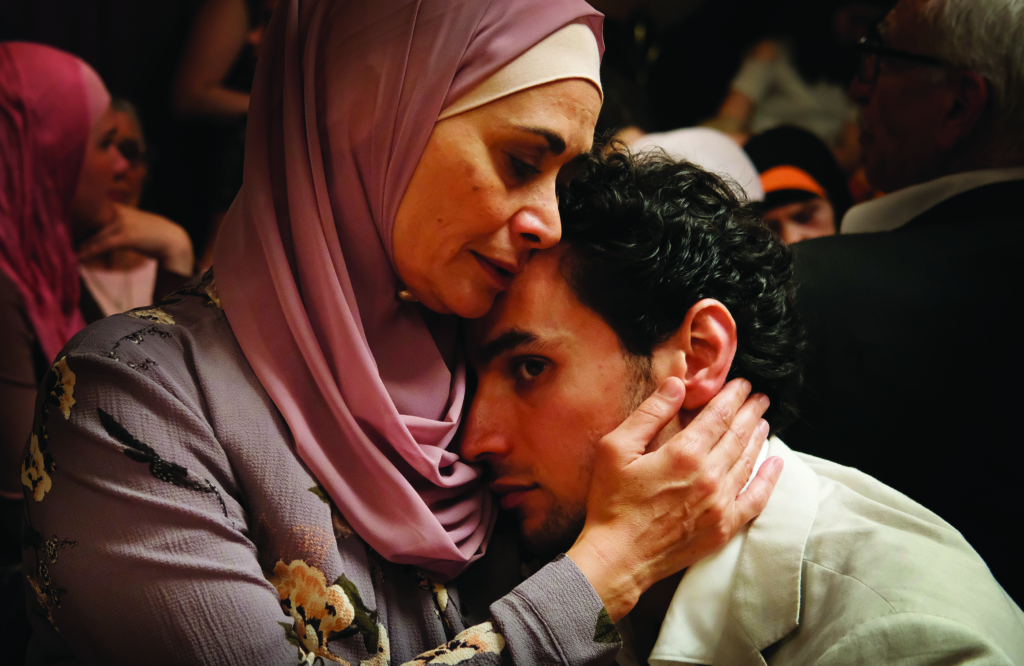
One night, he and Lentin were taking turns ferrying their restless daughter outside when he saw one of these young poets leaning against a wall, her face illuminated by the ghostly blue halo cast by her iPhone screen. His mind raced back to that missing-girl poster in Mumbai. ‘The visual was really beautiful, and yet I immediately wondered: what would happen if she disappeared now?’ At the time, then–prime minister Tony Abbott’s hardline stance against refugees saw him accused of playing into Islamophobic sentiment, as did the tough words of his then–immigration minister, now–prime minister Scott Morrison.[3]See ‘Morrison Has Failed to Call Out Islamophobia’, The Sydney Morning Herald, 23 March 2019, <https://www.smh.com.au/politics/federal/morrison-has-failed-to-call-out-islamophobia-20190322-p516k1.html>, accessed 29 July 2019. So it was that the nightly news storm faced by the Muslim-Australian community informed Slam’s poetic fightback.
While Ameena opens the film with a clarion call, she soon vanishes – though the spectre of her battle cry remains. Distressed at her uncharacteristic disappearance, her estranged brother Tariq (Adam Bakri, the Palestinian lead of Hany Abu-Assad’s Oscar-nominated 2013 film Omar) – going by the anglicised name ‘Ricky’ – is frustrated by the apparent reluctance of police to investigate all avenues. He’s horrified by the Islamophobic comments he uncovers under videos of Ameena’s performances on social media, as well as the incendiary rumours later whipped up by the media that she may have fled Australia to join the Islamic State. The abuse unlocks complicated emotions over his personal choice to assimilate – something his firebrand sister refused to do – blending in with his Caucasian wife Sally’s (Rebecca Breeds) social circle. ‘[Ricky has] whitened himself, in a certain sense, tried to become part of the majority,’ Sen-Gupta says,
but he never can; they won’t let him. And, suddenly, he finds himself drawn back into the vortex left by [Ameena’s] absence, which incites hysteria, this vile violence that people have in their minds because a woman wears a scarf on her head.
The poems heard in the film are the handiwork of Lebanese-Palestinian-Australian slam star, activist and queer storyteller Candy Royalle, who died in June last year after a long fight with ovarian cancer.[4]See Janine Israel, ‘“A Fierce Bright Light”: Poet and Activist Candy Royalle Dies, Aged 37’, The Guardian, 25 June 2018, <https://www.theguardian.com/culture/2018/jun/25/a-fierce-bright-light-poet-and-activist-candy-royalle-dies-aged-37>, accessed 29 July 2019. Sen-Gupta was introduced to her work by Bankstown-based spoken-word artist Miles Merrill, and the director was magnetised by her vocal power: ‘I looked at several Arab poets, but Candy had this strength in her voice. She was fearless.’ He continues:
She was fighting all the time. That was her life. When I met her, I knew she had cancer. She had been in remission several times, but again this disease was eating her up […] She knew she didn’t have a lot of time, but she had a lot to say. She had no fear.
‘[Ricky has] whitened himself, in a certain sense, tried to become part of the majority … And, suddenly, he finds himself drawn back into the vortex left by [Ameena’s] absence, which incites hysteria, this vile violence that people have in their minds because a woman wears a scarf on her head.’
—Partho Sen-Gupta
Sen-Gupta recalls that the content of Royalle’s poems made the film’s producers ‘fearful’ – ‘when I first read it, I was like, “Woah, some people may feel very attacked by this poetry.”’ With Royalle delivering her commissioned poems not long before shooting commenced in Western Sydney, however, those working behind the scenes didn’t have enough time to worry about her provocations. In the end, Sen-Gupta believes that, within this fraught conversation, punches cannot be pulled: ‘It has happened in the past that we’ve preyed on minorities because of a small difference. We preyed on Jews many years ago, and it ended up with the Shoah.’ As a piece of activist art, Slam would not be silent.
Mirror, mirror
Ricky’s discomfort at his tacit complicity in Islamophobia, evident in his having buried his own Muslim identity, becomes increasingly pronounced the more he discovers about his estranged sister’s life. And Sen-Gupta, whose Hindu Bengali parents fled their homeland in 1947 after partition[5]See Sarah Ansari, ‘How the Partition of India Happened – and Why Its Effects Are Still Felt Today’, The Conversation, 10 August 2017, <https://theconversation.com/how-the-partition-of-india-happened-and-why-its-effects-are-still-felt-today-81766>, accessed 29 July 2019. and lived in a refugee camp for many years, says he’s very familiar with the internal conflict experienced by the outcast seeking acceptance and the structural barriers they face.
Wherever we live – whether that is in Australia, or India, or France – there is a mythology forwarded by the state, by its people, that creates certain rules and boundaries for how we behave and how things are dealt with. So Ricky is trying to fit into that ‘Aussie’ mould. But what is that? Who decided what that framework was, and how that looks, or talks, or behaves, or reacts?
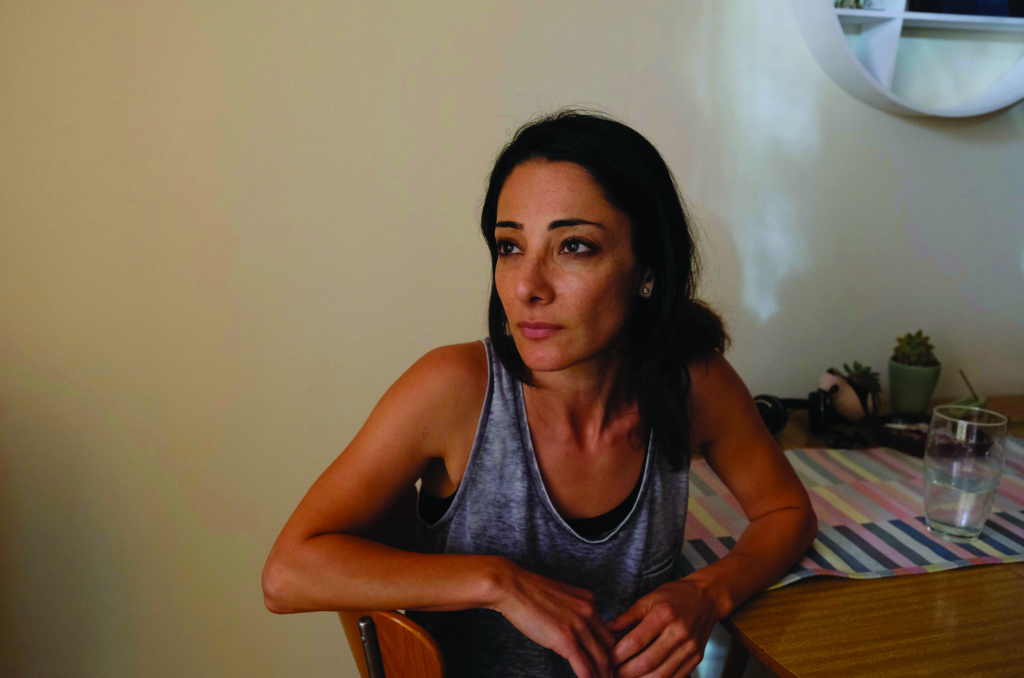
Interestingly, as Ricky pushes back against the demonisation of Ameena and pulls away from the anglicised self-concept he has built for himself, the detective assigned to his sister’s missing-person case, Joanne (Rachael Blake), similarly finds her rigid worldview unmoored. Through blood-red, Lynchian flashbacks, we discover that her soldier son died in the Afghanistan conflict. This painful loss binds her to Ricky and Ameena’s mother, Rana (Darina Al Joundi), though the latter does not get to enjoy the minimal peace that would be afforded by any knowledge of Ameena’s fate, fearing her lost to the Islamic State. ‘The loss of a child is a big connection,’ says Sen-Gupta.
A story of mothers giving their children away to war, making the ultimate sacrifice and wondering why our children have to die for some cause that men have decided on […] The violence that society generates for us is gratuitous, and we have to bear the consequences.
In turn, confronting the hatred directed at Ameena rattles the shaky foundations of Joanne’s racist notions, just as Ricky’s belief in the power of passing as white wobbles. ‘[Joanne] is part of that system. And she now feels that she doesn’t fit into that system – it’s not right. That is the parallel I wanted to create between these two characters,’ explains Sen-Gupta. ‘They are both struggling, trying to understand, “How do I fit in?” In a way, they meet in the same space, and the system fails them both.’
No women, no cry
Sen-Gupta didn’t intend to complicate his own life by casting Omar star Bakri, flying him into Sydney from his home in New York and engaging an accent coach to get the Western Sydney twang right. However, the director explains that he couldn’t quite find what he was looking for on local shores.
Naturally, I wanted someone who was Australian and had these lived experiences, and I did go around trying to find someone. But the pool is very small here. I wanted someone less bulky, who did not present as hyper-masculine, and I’m sorry to say that I didn’t find anybody.
‘There is a mythology forwarded by the state, by its people, that creates certain rules and boundaries for how we behave and how things are dealt with … Who decided what that framework was, and how that looks, or talks, or behaves, or reacts?’
—Partho Sen-Gupta
It was important to the director that strict preconceptions around gender roles were up-ended in Slam. Even as he searches for the truth, for instance, Ricky remains quite passive: his doe eyes seem always unsure, on the brink of tears. ‘Tariq is not in charge, in any way,’ Sen-Gupta suggests. ‘He lets everyone else decide for him how things should go, until the point he decides he has to take charge.’ Even when he does come into his own, it is by becoming an avatar of his missing sister: gradually, Ricky rejects his carefully constructed act of white-passing, instead embracing Ameena’s subversive poetry to push back against the injustices he sees. Again, this narrative element had the film’s producers worried, but Sen-Gupta was committed to ‘destroy[ing] these binaries we have, especially in Australian society’. The director recalls his shock when, not long after moving here, he witnessed a father tell his daughter’s childcare teacher to ‘man up’ simply because he had joined his female colleagues in dyeing his hair bright red for an event.
[The carer] was a sweet guy and all the children loved him. I was like, ‘What the fuck are you talking about? He is who he is. That’s his way of being. How dare you say that to him?’ So I’m trying to break that binary in a very subtle way in Slam. The strength lies in the female characters.
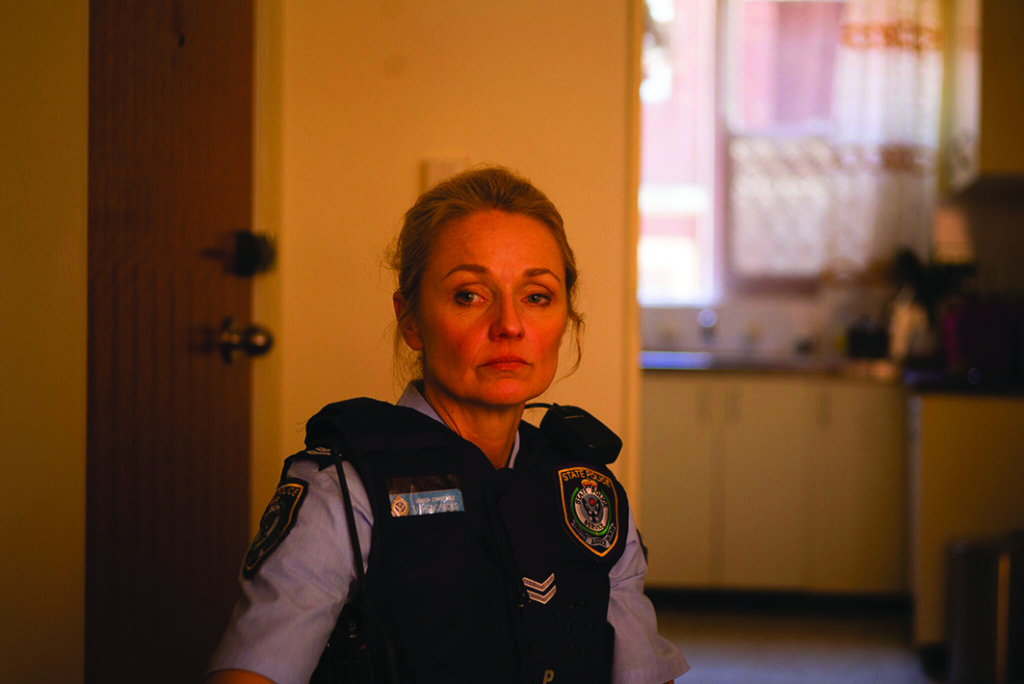
There is a shadow, too, of this idea in Joanne’s abusive ex-partner Shane (Damian Hill, who also died last year, in September[6]Hill also wrote and co-wrote (respectively) the screenplays for Paul Ireland’s Pawno (2015) and MIFF 2019 Premiere Fund feature Measure for Measure; see Karl Quinn, ‘Australian Actor Damian Hill, Star of Pawno, Dead at 42’, The Age, 24 September 2018, <https://www.theage.com.au/entertainment/movies/australian-actor-damian-hill-star-of-pawno-dead-at-42-20180924-p505l3.html>, accessed 29 July 2019.). ‘Shane was supposed to be this big, strong guy, but very disturbed, trying to work out his own masculinity,’ Sen-Gupta recalls.
I think Damian gave me that. He was big and strong, but very sensitive in a certain way that helped create that character.
That news [of his death] shocked me. How can that happen to someone so young and so talented? This industry can be really tough, but he had a new film about to shoot. I knew Candy had cancer, but it was a big shock for me to lose both of these people, and yet continue to see and hear them alive in my film.
Without a doubt, Slam thrums with life, with voices unafraid to speak up; as Sen-Gupta sees it, he has made ‘a film about violence – extreme violence – and patriarchy, and the trauma that these characters face because of [those]’. They are injustices that Joanne and Ricky will no longer accept, facing them down together in the end after having been brought side by side by listening to Ameena’s voice. Gone but not forgotten, the poet and her plight reverberate – much like the girl on that missing-person poster in Mumbai.
Endnotes
| 1 | Rituparna Bhattacharyya, ‘Sociologies of India’s Missing Children’, Asian Social Work and Policy Review, vol. 11, no. 1, 2017, p. 92. |
|---|---|
| 2 | For more information regarding the real-world Bankstown Poetry Slam, see <http://www.bankstownpoetryslam.com/home>, accessed 29 July 2019. |
| 3 | See ‘Morrison Has Failed to Call Out Islamophobia’, The Sydney Morning Herald, 23 March 2019, <https://www.smh.com.au/politics/federal/morrison-has-failed-to-call-out-islamophobia-20190322-p516k1.html>, accessed 29 July 2019. |
| 4 | See Janine Israel, ‘“A Fierce Bright Light”: Poet and Activist Candy Royalle Dies, Aged 37’, The Guardian, 25 June 2018, <https://www.theguardian.com/culture/2018/jun/25/a-fierce-bright-light-poet-and-activist-candy-royalle-dies-aged-37>, accessed 29 July 2019. |
| 5 | See Sarah Ansari, ‘How the Partition of India Happened – and Why Its Effects Are Still Felt Today’, The Conversation, 10 August 2017, <https://theconversation.com/how-the-partition-of-india-happened-and-why-its-effects-are-still-felt-today-81766>, accessed 29 July 2019. |
| 6 | Hill also wrote and co-wrote (respectively) the screenplays for Paul Ireland’s Pawno (2015) and MIFF 2019 Premiere Fund feature Measure for Measure; see Karl Quinn, ‘Australian Actor Damian Hill, Star of Pawno, Dead at 42’, The Age, 24 September 2018, <https://www.theage.com.au/entertainment/movies/australian-actor-damian-hill-star-of-pawno-dead-at-42-20180924-p505l3.html>, accessed 29 July 2019. |
